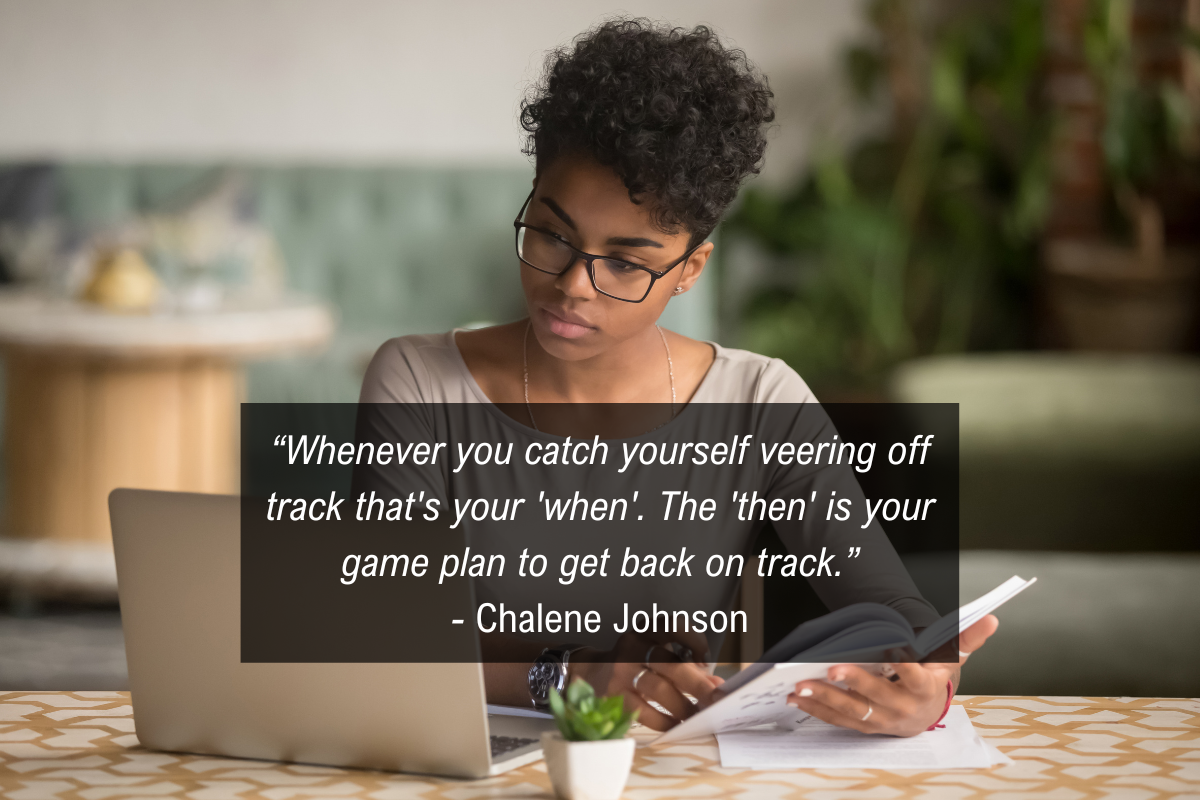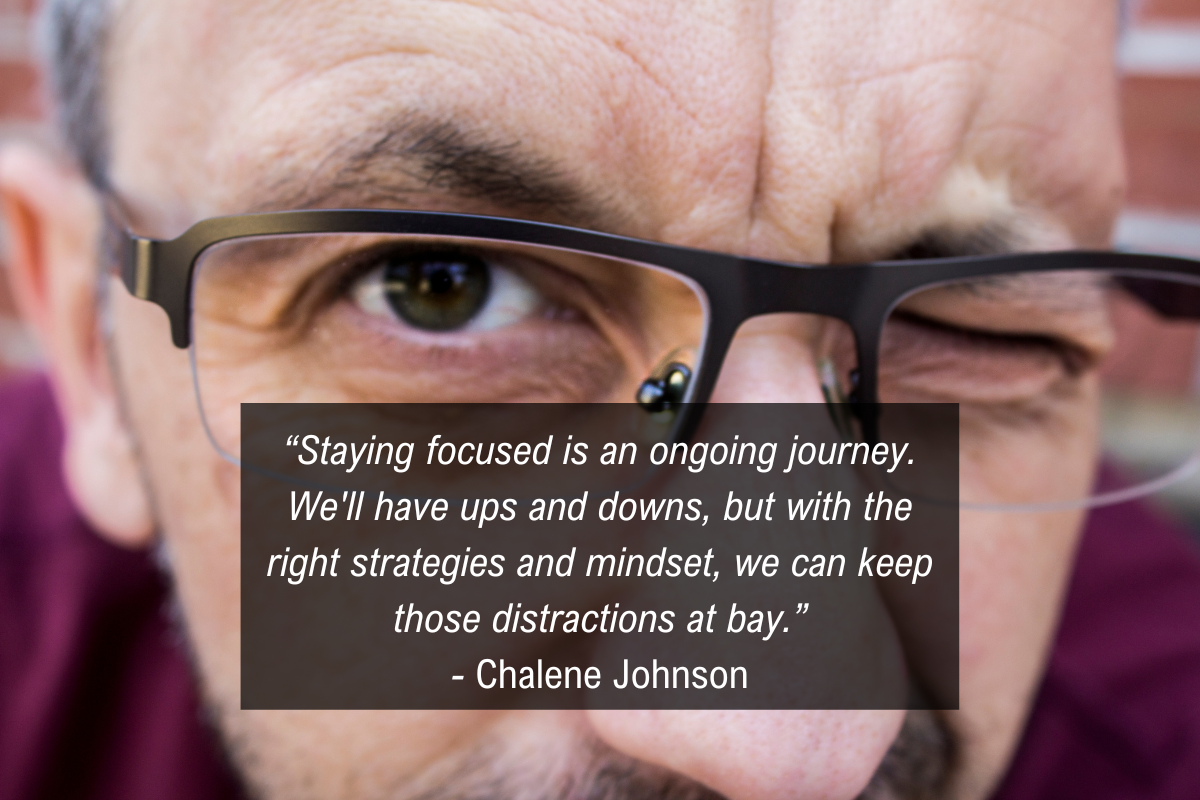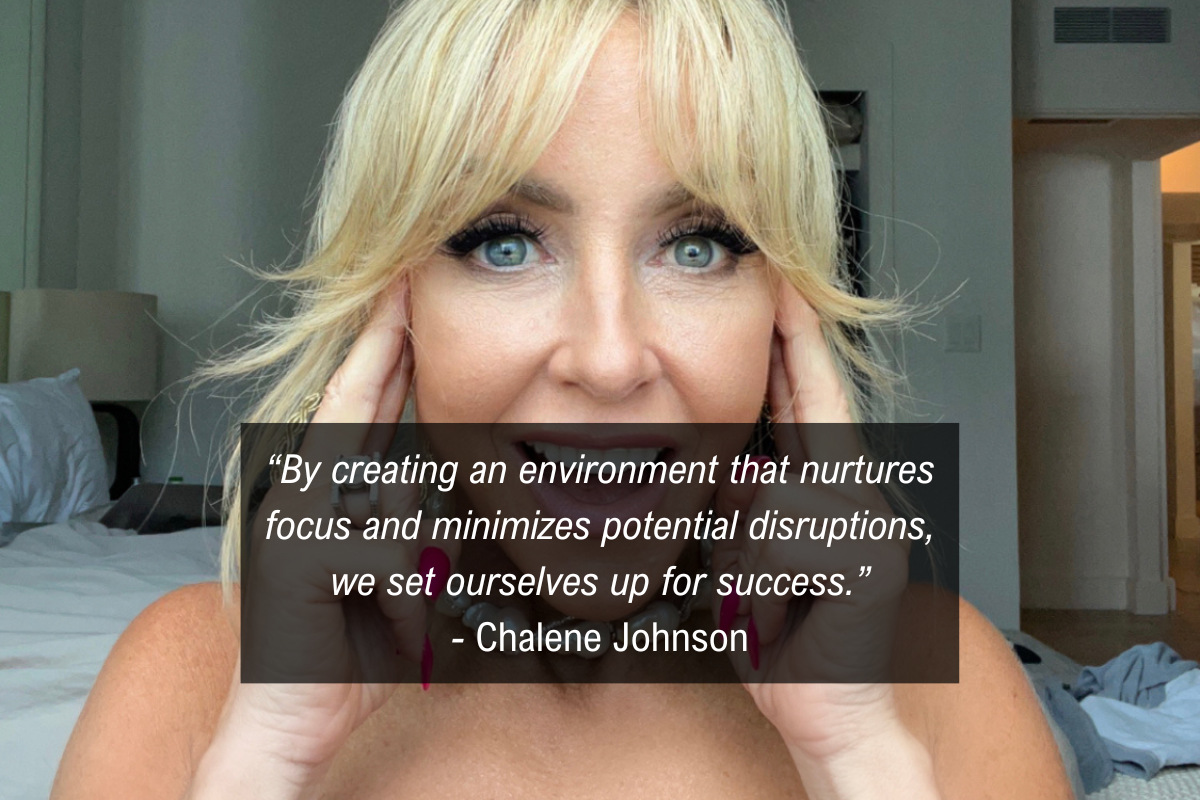If you're like me, you've probably had those days where you're spinning in circles, pulled in every direction by your to-do list, notifications, and every shiny object that comes your way. If that's you, today's topic of focus is going to be a game-changer.
Table of Contents
ToggleLet's dive deep into the concept of focus.
Recognizing the Distraction Dilemma
I get it. Distractions are everywhere, and they can rob us of our focus. Some days, despite our best intentions, our concentration is hijacked, leaving us overwhelmed and unproductive. I've been there — staring at a long to-do list, getting everything but my priorities done. And I've learned it's not just about getting back on track. It's about understanding the root of these distractions and reshaping our mindset around focus.
The Power of Single-Tasking
In our fast-paced, multitasking world, we often forget the value of single-tasking. Concentration isn't about juggling a million tasks; it's about zoning in on one task at a time and giving it your undivided attention. It's that laser-beam focus that can elevate the quality of your work and reduce mistakes.
From Chaos to Clarity
Growing up, focus was not my forte. With a whirlwind of activities and changes in topics at home, I was always in a state of flux. The school was a challenge, and so was the outside world. College, jobs, adulthood – it felt like I lacked a skill everyone else naturally had. It wasn't until my mid-20s, when enough people pointed out my need for focus, that I began seeking solutions. That’s when I stumbled upon Brian Tracy and his game-changing book, “Eat That Frog.” This book was a lightbulb moment, offering strategies to hone my focus and get things done. It was about tackling that big, ugly task (or frog) first thing, setting the tone for the rest of the day.
Distractions: A Deeper Dive
To overcome distractions, it's essential to understand the ‘why' behind them. Why are we so keen on sidetracking ourselves? Often, distractions serve as an escape from something we don't want to face or feel. Whether it's procrastinating from a daunting task or numbing past trauma, distractions give us temporary relief. And in this digital age, smartphones have become the ultimate distraction tool. Every ding and buzz demands our attention, luring us away from what truly matters. That's why I've made a conscious effort to minimize my phone usage and instead, grab my push journal to stay on track.
Identifying Your Distraction Triggers
We all have our go-to distractions. For me, organization tasks and social media top the list. But there's also diving into random rabbit holes of information or getting lost in solving someone else's problems. Recognizing these triggers is the first step to addressing them. So take a moment, jot down your distractions, and let's tackle them head-on in our next segment.
The Timing of Temptations: Identifying Your Moments of Weakness
It's often said that timing is everything. Well, in the realm of focus, that couldn't be truer. We need to pinpoint the exact moments when we are most likely to be led astray by the allure of distraction.
The Unseen Roadblocks That Derail Big Tasks
Have you ever found yourself just about to delve deep into an important task, only to be derailed by the smallest things? For me, today was the perfect example. Here I was, getting ready to record another enlightening episode of The Chalene Show, and I found myself distraught over a wrinkle in my carpet. I mean, come on! How can one possibly concentrate when the room is in such chaos, right?
The Brain's Rebellion
These moments often arise just before diving into something that demands our full attention. It's like our brain's way of rebelling against the impending responsibility. At the gym, between intense workouts, I sometimes find myself checking my phone or aimlessly scrolling through social media. It's not about laziness; it's just a fleeting moment of distraction.
Striking a Balance: Distinguishing Between Distractions and Deserved Breaks
The pattern is clear – I often feel the pull of distractions just before engaging in tasks that require my undivided focus. So identifying when these temptations occur is crucial. But remember, there's a big difference between unwarranted distractions and well-deserved breaks. Sometimes, after extended periods of concentration, our brain does need a breather.
The ‘What': Identifying and Confronting Your Go-To Distractions
Once you know when your focus wavers, the next step is to decipher exactly what it is that tempts you. For me, it's those seemingly productive activities. Organizing a room, browsing social media, or even helping out a friend in need. While these tasks might seem benign, even beneficial at times, they can quickly snowball into hours of procrastination.
It's essential to distinguish between genuine productivity and what I like to call “destination procrastination.” For example, rearranging a room might seem like a productive use of time. Still, when it's used as an excuse to avoid another pressing matter, it's merely a distraction.
It's crucial to put these distractions to paper. Write down everything that could potentially lead you astray. By acknowledging these temptations, you're arming yourself against future distractions.
Time Blocks: Your Weapon Against Distraction
With your list of tasks and distractions in hand, it's time to organize your day. Time blocking isn't about adhering to a rigid timetable; it's about allocating chunks of time for specific tasks. Think of it as a roadmap to your day.
Why Leaving Wiggle Room is a Game-Changer for Your Schedule
But here's the thing – life is unpredictable. So while it might be tempting to pack your schedule tight, it's essential to leave some wiggle room. Always overestimate the time it might take for a task. This way, if things go smoothly, you'll find yourself with extra time on your hands, which you can use for those fun activities or even a little relaxation.
And, if you're anything like me and have a slightly distorted perception of time (thanks ADHD), these buffers are lifesavers.
How Liminal Moments Can Make or Break Your Productivity
Now, you might be wondering: “But I have a routine. Why do I need to write everything down?” Here's why: Liminal moments. These are the periods of transition, the in-between times when you're shifting from one activity to another. They are the prime moments when distractions pounce. So, having your tasks penned down provides clarity and direction, keeping you on track.
Liminal Moments: The Gaps In Focus
Have you ever been on the brink of accomplishing something when suddenly a stray thought or unexpected sound derails your focus? This transitional state, this “between” phase, is what we refer to as a liminal moment. It's that split-second of uncertainty where your focus falters, opening up the potential for distraction.
These liminal moments happen to all of us. It could be when you're switching between tasks, or maybe when you're done with a particular task and are deciding what to tackle next. It's in these spaces that our minds often wander, and that's when distractions find their way in.
Capitalizing On When-Then Strategies
Instead of allowing these gaps in concentration to lead us astray, we need to develop a strategy to combat them. This is where the ‘when-then' principle comes into play. Whenever you catch yourself veering off track, or about to, that's your ‘when'. The ‘then' is your game plan to get back on track.
Mastering Impulse Control
It's easy to get swept away by the rush of dopamine we get from indulging in distractions. But with practice and intention, we can harness our impulse control. By creating an environment that nurtures focus and minimizes potential disruptions, we set ourselves up for success.
Therapy: A Path To Clarity
Emotions are strong distractors. Whether it's unresolved conflict, grief, or personal challenges, these emotional states can easily divert our attention from the task at hand. That's where therapy can play a pivotal role. By addressing and resolving these emotional roadblocks, therapy can lead to a clearer, more focused mind.
Personal Tip: I’ve personally used Talkspace and it’s a game changer. Think about it: a dedicated space for you to process, understand, and overcome those emotional hurdles that have been pulling you off track. You can check it out here.
Implementing And Customizing Focus Strategies
These strategies I've shared have worked wonders for me, but it's important to remember that we're all unique. You may need to tweak or combine different methods to find what's most effective for you. The key is consistency and finding a routine that works.
In summary, here are my top 5 tips:
- Embrace Single-Tasking Over Multitasking
- Identify and Understand Your Distractions
- Utilize Time Blocking and Buffer Times
- Be Mindful of Liminal Moments
- Invest in Emotional Well-being
Dive Deeper Into Staying Focused
If you found this episode valuable, you might enjoy episode #1018 of The Chalene Show. Want a more visual take? Check out the accompanying YouTube video.
Links from this episode:
Thank you, lifers, for hanging out with me. Remember, staying focused is an ongoing journey. We'll have ups and downs, but with the right strategies and mindset, we can keep those distractions at bay. I value each and every one of you. Remember, life's a journey – stay focused and enjoy every moment!





